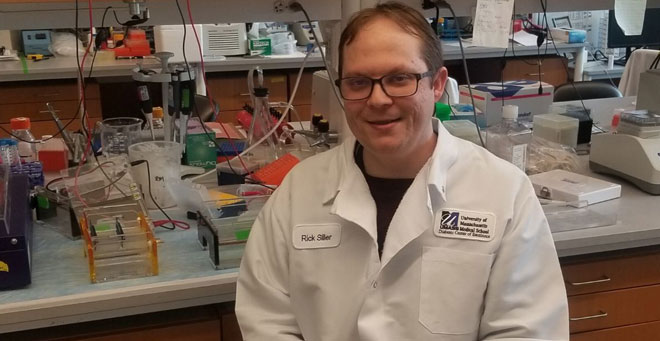
Glass Family Fellow in Diabetes Research. |
The UMass Diabetes Center of Excellence has established the Glass Family Fellow in Diabetes Research through a gift from Scott and Patricia Glass. It was presented to Richard A. Siller, PhD, postdoctoral research fellow in the laboratory of René Maehr, PhD, the Glass Charitable Foundation Term Chair in Diabetes and associate professor of molecular medicine. Their research addresses a fundamental question: how immune cells are trained by the thymus. The Maher lab has developed a 3D model of the thymus and is working to create a functional human thymus from stem cells.
“This award was designed to support a promising young scientist for a two-year postdoctoral experience focused exclusively on research to cure type 1 diabetes,” said David M. Harlan, MD, the William and Doris Krupp Chair in Diabetes, professor of medicine and co-director of the Diabetes Center of Excellence. “Dr. Siller has gained international experience and his work has already been published in top journals.”
After graduating from the University of Michigan, Siller earned his Master’s of Research in functional genomics while working in two European labs. At the University of York in England, he worked in the lab of Mark Coles, PhD, where he studied mouse models of immune and thymic cells. He was also mentored by Tobias Cantz, PhD, at the Hannover Medical School in Germany, where they developed methods to generate liver cells from stem cells, with a long-term goal of providing stem-cell based therapies for liver disease.
Upon completion of his master’s degree, he spent two years working at University of Edinburgh in Scotland, under Ian Wilmut, who gained international fame for cloning the first mammal, Dolly, the sheep, in 1996.
Siller, whose father is also a scientist, said, “Watching my dad and the influence he had on people when I was growing up, I knew that I wanted to one day get involved in research,” he said. “The Glass Family Fellow in Diabetes Research at UMass Medical School will prepare me to one day launch my own independent career as a scientist.”
Siller earned his PhD at University of Oslo in Norway, where he developed a novel protocol to reprogram human stem cells into liver cells. His research in the lab of Gareth Sullivan, PhD, resulted in numerous publications, including Small-Molecule-Driven Hepatocyte Differentiation of Human Pluripotent Stem Cells. “Several labs throughout the world have successfully repeated and cited our protocol,” said Siller. “I believe it has the potential to lead to therapies for various maladies.”
Siller is eager to work toward creating a fully functional human thymus in the Maher Lab. “It has the potential to help us understand both type 1 and type 2 diabetes, but also other autoimmune diseases, and with implications for other illnesses too, including cancer,” said Siller. “Very few labs in the world are working on this and I believe we’re on the right track to make it a reality.”
The collaborative environment at UMass Medical School was attractive to him when he decided to accept the position in the Maher Lab. “These are by far the most supportive and collegial group of people I’ve ever worked with,” he added.
He said he is motivated most by the goal of ultimately developing therapies to help people living with diabetes, liver disease and other ailments. “If we can determine why people with type 1 diabetes suffer the consequences of the autoimmune attack on their insulin producing cells, there’s the potential to screen for new drugs, develop therapies and/or make genetic modifications to correct it.”